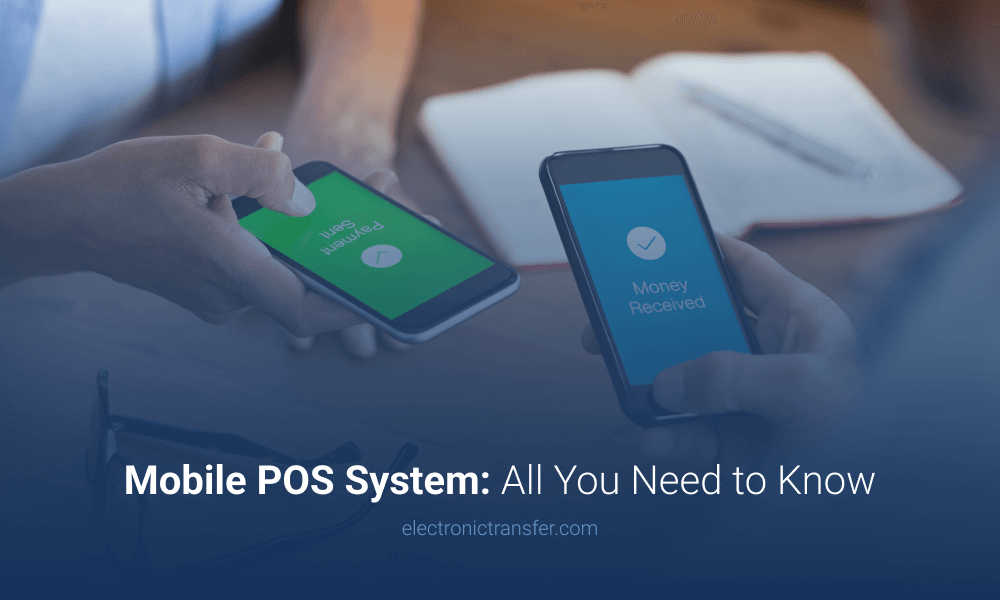Mobile POS System: All You Need to Know

A mobile POS (mPOS) system is essentially a point-of-sale software like any other. The main difference is that it is portable and can be used on mobile devices, such as smartphones and tablets.
Thanks to the rise of mobile payments and cashless transactions, mobile POS systems are also on the rise. Stay with us, as we outline everything you need to know about these point-of-sale systems.
“Mobile POS systems are not just about flexibility; they’re redefining how customers expect to interact with businesses.”
– Scott Ellison, VP of Mobile Commerce at PayPal (2012-2018)
How to Choose the Best Mobile POS System: Key Features
- Payment Versatility
- Inventory and Sales Tracking
- Personalization and Loyalty Programs
- Integration with Other Tools
- Security
- Offline Functionality
- Scalability and Customization
1. Payment Versatility
The versatility of a mobile POS is paramount. Since an mPOS can operate on portable devices, it allows businesses to complete transactions practically anywhere.
It is important to be fully flexible, which means a mPOS should be able to support several payment methods, including credit and debit cards, and digital wallets (Apple Pay, Google Wallet).
“Today’s consumers expect a seamless payment experience across all channels, making multi-payment acceptance a critical mPOS feature.”
– Karen Webster, CEO of PYMNTS.com
2. Inventory and Sales Tracking
More often than not, mobile POS systems provide integrated inventory and sales tracking. These features help businesses track and analyze sales trends over long periods of time.
Being able to track these can let your business reduce overstock or keep stocked on popular products.
“Inventory management integrated within mPOS systems provides retailers visibility and control over their stock, ensuring that they meet customer demands efficiently.”
3. Personalization and Loyalty Programs
Offering personalized offers is very important in the 2020s. Now, most people expect brands to provide deals and promotions that are tailored to their specific needs and preferences.
There are some mobile POS systems that allow this through data collection, giving you the opportunity to personalize your offers.
“Capturing customer data at the point of sale is invaluable for creating meaningful, targeted marketing that keeps customers coming back.”
– Dharmesh Shah, CTO of Hubspot
4. Integration with Other Tools
Of course, mobile point-of-sale systems should be able to easily integrate with other business tools you are using (CRM, inventory management, accounting, etc.).
A successful integration will lead to a reduction in manual data entry and make it possible to track real-time data.
“Integrating mPOS with other tools saves time, reduces errors, and enables better decision-making, as businesses can access comprehensive data from one place.”
– Lisa Falzone, Co-Founder and President of Athena Security
5. Security
As with everything related to payments, security is paramount. mPOS systems must offer features that protect the data of customers, including tokenization, advanced encryption, and compliance with PCI-DSS standards.
Additionally, they allow for secure payments through various methods, including EMV chip cards, contactless payments, and mobile wallets.
“End-to-end encryption and PCI compliance are non-negotiables for payment security in mPOS systems, which is essential for maintaining customer trust and protecting sensitive data.”
6. Offline Functionality
What do you do when you lose your internet connection? You could tell customers that they can only pay with cash, but that might ruin the whole experience for them. That’s why, using a mobile POS that has offline functionality can be a real saver.
The device processes the transactions offline and then syncs data when a connection is available. Such a feature will ensure you don’t miss out on sales – it can be invaluable for your business.
7. Scalability and Customization
A great mobile POS system should be able to provide flexibility and scale with your business. This means integrating new software features or adding additional devices.
What’s more, some systems allow you to make industry-specific customizations. For example, tableside ordering for restaurants or customer feedback collection.
Pros and Cons of a Portable POS System
Pros:
- Mobility. One of the best things about a mPOS is that you can use it to make transactions from literally anywhere.
- Customer Experience. Portable POS systems offer customers a lot of features, such as contactless payments and faster checkouts, that enhance their experience.
- Real-time Data. A lot of mPOS systems are cloud-based, which means that they can provide real-time data and updates for inventory, sales, and customer information.
Cons:
- Limited Functionality. Portable point-of-sale systems have their limitations when compared to traditional POS. This is most valid for advanced features, such as complex reporting or extensive hardware compatibility.
- Dependencies. While an mPOS is very flexible, it is still dependent on mobile devices and battery life. Long usage can drain battery power, potentially leading to inconveniences during peak hours.
- Hardware Limitations. Another limitation of portable POS devices is related to hardware. Tablets and smartphones are typically less durable than traditional POS terminals. They are also more prone to damage, especially in outdoor environments.
Electronic Transfer: POS Solutions
Electronic Transfer’s POS software credit card processing platform aims to provide the best experience for businesses when handling transactions.
Our POS software is not only very easy to use, but we provide, among other services, multiple payment options, and real-time inventory management, with an intuitive interface that will allow your team to deliver top-of-the-line services.
On top of that, we offer advanced encryption and security features that fully comply with industry standards and regulations.
Last but not least, Electronic Transfer has no sign-up fees, no monthly minimum, and no cancellation fees. Trust our over 30 years of experience, and sign up for our services now.


